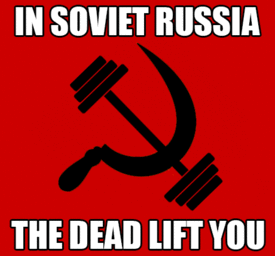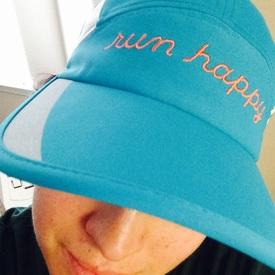Exercise Calories...Again
Options

reginab1984
Posts: 41 Member
"Can I eat back my exercise calories?" I know it's been asked, time and time again, and the answers are typically as follows: 1) "No." 2) Only eat back 50%, because MFP and typical gym equipment overestimates calories burnt." I understand all of that. But, I'm a runner, and I use RunKeeper to track my runs. It has my stats (height, weight, etc...) and monitors every single aspect of my run: distance, pace, etc... As a result, I feel that RunKeeper's estimations of the calories I burn are pretty accurate, since it bases the end result off of my personal stats and my run stats. I have MyFitnessPal linked with RunKeeper, so the calories that RunKeeper says I burned are reflected on my diary for that day. So, here's the question again: Can I eat back these exercise calories without cutting them in half, since I feel the original number is pretty accurate?
0
Replies
-
I've never tried runkeeper. It sounds more accurate than what you get on the gym equipment. Is it usually higher or lower than those estimates or about the same? Does it monitor heart rate? The only ones that I feel are really accurate measure heart rate.
The only way to know for sure is to try it. Try eating them back and see if you still move towards your goal. If not then try eating only 50% or none. Do what works for you. What works for you may not work for others, so very often it's trial and error.0 -
What it probably does not account for is you adapting to the training. A beginner might run a 5k and be exhausted where as an experienced runner may just be getting warmed up. The better you become at an activity, the less calories it causes you to burn. I don't ever log exercise. I never see the point. I use the tdee method to calculate calories. Just pick any reasonable number to start with, eat that many calories for 3 weeks doing your normal level of activity. If you do not lose weight after 3 weeks, decrease the calories slightly and repeat. If you do lose weight, make no change. If your goal was to gain weight, do the same thing but increase calories slightly after 3 weeks if you don't gain. If you goal is to maintain adjust calories in whichever direction you need to for maintenance.reginab1984 wrote: »"Can I eat back my exercise calories?" I know it's been asked, time and time again, and the answers are typically as follows: 1) "No." 2) Only eat back 50%, because MFP and typical gym equipment overestimates calories burnt." I understand all of that. But, I'm a runner, and I use RunKeeper to track my runs. It has my stats (height, weight, etc...) and monitors every single aspect of my run: distance, pace, etc... As a result, I feel that RunKeeper's estimations of the calories I burn are pretty accurate, since it bases the end result off of my personal stats and my run stats. I have MyFitnessPal linked with RunKeeper, so the calories that RunKeeper says I burned are reflected on my diary for that day. So, here's the question again: Can I eat back these exercise calories without cutting them in half, since I feel the original number is pretty accurate?
0 -
I've never tried runkeeper. It sounds more accurate than what you get on the gym equipment. Is it usually higher or lower than those estimates or about the same? Does it monitor heart rate? The only ones that I feel are really accurate measure heart rate.
The only way to know for sure is to try it. Try eating them back and see if you still move towards your goal. If not then try eating only 50% or none. Do what works for you. What works for you may not work for others, so very often it's trial and error.
It's usually lower than what my treadmill would say for the same distance, and lower than what you would get if you looked up, say, one hour of running at moderate pace on MFP.0 -
What it probably does not account for is you adapting to the training. A beginner might run a 5k and be exhausted where as an experienced runner may just be getting warmed up. The better you become at an activity, the less calories it causes you to burn. I don't ever log exercise. I never see the point. I use the tdee method to calculate calories. Just pick any reasonable number to start with, eat that many calories for 3 weeks doing your normal level of activity. If you do not lose weight after 3 weeks, decrease the calories slightly and repeat. If you do lose weight, make no change. If your goal was to gain weight, do the same thing but increase calories slightly after 3 weeks if you don't gain. If you goal is to maintain adjust calories in whichever direction you need to for maintenance.reginab1984 wrote: »"Can I eat back my exercise calories?" I know it's been asked, time and time again, and the answers are typically as follows: 1) "No." 2) Only eat back 50%, because MFP and typical gym equipment overestimates calories burnt." I understand all of that. But, I'm a runner, and I use RunKeeper to track my runs. It has my stats (height, weight, etc...) and monitors every single aspect of my run: distance, pace, etc... As a result, I feel that RunKeeper's estimations of the calories I burn are pretty accurate, since it bases the end result off of my personal stats and my run stats. I have MyFitnessPal linked with RunKeeper, so the calories that RunKeeper says I burned are reflected on my diary for that day. So, here's the question again: Can I eat back these exercise calories without cutting them in half, since I feel the original number is pretty accurate?
In this situation, though, a beginner's 5K will be a lot slower than a more experienced runner's 5K. The beginner might average a 12 minute mile, which would result in fewer calories burnt than the experienced runner who averaged a 9 minute mile. And yes, once a runner becomes more experienced and "perfects" his or her form, fewer calories are burnt due simply to economy of motion in the stride, foot strike, arm swing, etc... However, I tend to believe that the decrease in calories burnt due to improved form is made up for by increases in speed and distance (major calorie burners).0 -
I've stopped trying to figure out burn accuracy. over the years, I've stumbled upon my TDEE, and I've used that to map out my weekly allotment. I've changed my "goals" on here to reflect that I'm eating back 75%-80% of my burns.0
-
I don't worry about it as much for shorter runs, but when I get heavy into training and am burning 800, 900, 1,000, up to 1, 500 calories in a fairly short amount of time, it becomes a concern.0
-
I've used loads of different methods to estimate exercise calories in the last three years (3 different HRMs, two different phone apps for cycling, a power meter, web calculators, sometimes machine numbers for cardio, pure guesswork and gut feeling for strength/weight training.)
Some very accurate, some clearly not, some methods no way of verifying.
And I've eaten back my exercise calories the whole time I was losing weight and also maintaining weight. It works better than TDEE method of estimating them for me as although my weekly calorie burn is high it also varies enormously from day to day and week to week.
The secret is adjusting your calorie allowance based on actual results. Which also has the benefit of compensating for inaccuracies in your food logging.
BTW - you could cross check your Runkeeper numbers against a running calorie calculator such as this....
http://www.runnersworld.com/tools/calories-burned-calculator
0 -
If you are doing more than an odd run here and there and are training regularly, I would suggest it is very important to fuel your training adequately to assist with weight loss while making the training worth while.
Managing your macro nutrients and Nutrient timing are key ingredients to achieving your race weight.
If you aren't racing, just running for fun and enjoyment, I would maybe employee one of the methods above0 -
vankellett wrote: »If you are doing more than an odd run here and there and are training regularly, I would suggest it is very important to fuel your training adequately to assist with weight loss while making the training worth while.
Managing your macro nutrients and Nutrient timing are key ingredients to achieving your race weight.
If you aren't racing, just running for fun and enjoyment, I would maybe employee one of the methods above
I train four days a week, using a program that includes speed work, tempo runs, and long runs. I am trying to get to a lower race weight.
0 -
Trial and error. If you feel you need the extra calories, use them. After 6-8 weeks, check your progress. Are you losing? If yes, then good. If no, then you may want to lessen your intake.0
-
When all else fails, EXPERIMENT, OBSERVE, RECORD, MODIFY, VERIFY.
I mean,really, how hard is it to eat them back, see what happens in 3 or 4 weeks, make adjustments, and carry on.
This is about lifestyle, right?
Life. *A lifetime.*
A couple of weeks back and forth, or even a couple of months taking time to verify what works for your specific lifestyle and genetics, isn't going to derail a future lifetime of good habit, right?
Right?
0 -
This is basically what I was saying too. You're never going to be exact with anything so I'd rather be consistent. Rather then trying to estimate every variable, just deal with one, calories, and adjust them based on results.
The secret is adjusting your calorie allowance based on actual results. Which also has the benefit of compensating for inaccuracies in your food logging.
0 -
What it probably does not account for is you adapting to the training. A beginner might run a 5k and be exhausted where as an experienced runner may just be getting warmed up. The better you become at an activity, the less calories it causes you to burn.
Not really. Most people just go faster and burn more calories, rather than stay at the speed they started at.
0 -
Eat them! You'll train harder for not starving yourself and lose less lean body mass in the process. I've always eaten mine and have lost 117lbs so far. I use a FitBit One tracker which is more accurate than logging exercise here.0
-
I generally don't eat them all back, anyway. Which, again, isn't a big deal if you're talking about 300-400 calories, say. But when I get to the point where I'm running 5-10 miles again, we're talking about 500-1000 calories. That's a lot of calories!0
-
SergeantSausage wrote: »When all else fails, EXPERIMENT, OBSERVE, RECORD, MODIFY, VERIFY.
I mean,really, how hard is it to eat them back, see what happens in 3 or 4 weeks, make adjustments, and carry on.
This is about lifestyle, right?
Life. *A lifetime.*
A couple of weeks back and forth, or even a couple of months taking time to verify what works for your specific lifestyle and genetics, isn't going to derail a future lifetime of good habit, right?
Right?
Not about a lifestyle, actually.
She's trying to drop to race weight. Presumably there's a time limit to get there. Hopefully it's far enough to allow her time to experiment.0 -
OP, we're in a similar situation.
I eat back all or most of my run calories according to the .63*weight in pounds*mile equation; I don't eat back cross-training calories because I have no idea how to calculate them and they are my easy days right now (this will change in bike season). I'm losing weight at the rate I want to; actually a little faster. (That equation is more conservative than Garmin's estimate, which I imagine is a parallel to RunKeeper. So I wouldn't be surprised if RK/Garmin would get me closer.)0 -
SergeantSausage wrote: »When all else fails, EXPERIMENT, OBSERVE, RECORD, MODIFY, VERIFY.
I mean,really, how hard is it to eat them back, see what happens in 3 or 4 weeks, make adjustments, and carry on.
This is about lifestyle, right?
Life. *A lifetime.*
A couple of weeks back and forth, or even a couple of months taking time to verify what works for your specific lifestyle and genetics, isn't going to derail a future lifetime of good habit, right?
Right?
Couldn't agree more. Definitely experiment, find out what works for you. Personally, if I am not hungry, I don't eat any of them back, if I am, I eat some back until I'm not hungry. Works for me.0 -
Well put!SergeantSausage wrote: »When all else fails, EXPERIMENT, OBSERVE, RECORD, MODIFY, VERIFY.
I mean,really, how hard is it to eat them back, see what happens in 3 or 4 weeks, make adjustments, and carry on.
This is about lifestyle, right?
Life. *A lifetime.*
A couple of weeks back and forth, or even a couple of months taking time to verify what works for your specific lifestyle and genetics, isn't going to derail a future lifetime of good habit, right?
Right?
0 -
I always eat mine back. I use an HRM though. I also have used it for circuit training which I have seen people advise against but it has all worked. If I stay withing the calories MFP gives me and lose about what it says I should.0
-
I eat them back minus the amount of calories I would've burned by sitting on the couch (around 70-90/hour). Seems fair to me - I use a HRM to track my calories burned. I also use MapMyRun and I have to say that it is usually about 50-100 calories over what my HRM says. Not sure if that helps you, but it's how I roll.0
-
I think you've gotten some great answers. MFP blog posted something a while back about not eating (all) your exercises calories back. Everytime I mentioned this to my physician in the past, he laughed at me thinking I was trying to pull something over on him. I am in weight loss mode right now (will be bulking this year, then late in the year cutting) and if I'm hungry, I eat. If I'm not, I don't. I use MFP to hold myself accountable to my food and exericse...but use my bodymedia fit armband to see what I'm really burning and what I need to do in order to lose weight.0
-
I use RunKeeper, and I normally eat back the calories I burn during a workout. So far it's been working just fine and I've been losing right at 2lbs/week.
Just checked the calculator on Runner's World and it's spot on with what RK told me I burned today.
A thought on adapting to training: Yes, that's going to affect your calorie burn. But at the same time, as a beginner, a 5K is going to burn more because that person is taking longer to go the distance. An experienced runner using a 5K as a warmup is going to burn less because it's taking them far less time to cover that distance. So as long as you're keeping your stats accurate in RK, then the math looks like it will always add up.0 -
reginab1984 wrote: »"Can I eat back my exercise calories?" I know it's been asked, time and time again, and the answers are typically as follows: 1) "No." 2) Only eat back 50%, because MFP and typical gym equipment overestimates calories burnt." I understand all of that. But, I'm a runner, and I use RunKeeper to track my runs. It has my stats (height, weight, etc...) and monitors every single aspect of my run: distance, pace, etc... As a result, I feel that RunKeeper's estimations of the calories I burn are pretty accurate, since it bases the end result off of my personal stats and my run stats. I have MyFitnessPal linked with RunKeeper, so the calories that RunKeeper says I burned are reflected on my diary for that day. So, here's the question again: Can I eat back these exercise calories without cutting them in half, since I feel the original number is pretty accurate?
Actually it isn't as accurate as you think. I have map my run and even that isn't as high as MFP but it's higher than my HRM. On Map my run if it says 500 calories you can bet my HRM says 300 or below.0 -
Trial and error is the way to go. I don't eat mine back all the time. Some days I do eat them all. Some days I go over. Some days I only eat some. It balances out and I maintain doing that. When I start losing weight, I eat more. When I start gaining, I eat a little less.0
-
reginab1984 wrote: »"Can I eat back my exercise calories?" I know it's been asked, time and time again, and the answers are typically as follows: 1) "No." 2) Only eat back 50%, because MFP and typical gym equipment overestimates calories burnt." I understand all of that. But, I'm a runner, and I use RunKeeper to track my runs. It has my stats (height, weight, etc...) and monitors every single aspect of my run: distance, pace, etc... As a result, I feel that RunKeeper's estimations of the calories I burn are pretty accurate, since it bases the end result off of my personal stats and my run stats. I have MyFitnessPal linked with RunKeeper, so the calories that RunKeeper says I burned are reflected on my diary for that day. So, here's the question again: Can I eat back these exercise calories without cutting them in half, since I feel the original number is pretty accurate?
Sure, I did. With the exception of really long runs (90 mins +), which are impossible to eat back all of anyway and where I think you get overestimation because it doesn't back out the calories you'd otherwise burn, I always ate most of my running calories, or at least felt free to. I also used Runkeeper, and I always lost at about the predicted rate.
Some don't log that accurately and thus need to make up for it in part with the exercise calories, but if you are pretty confident in your logging, give it a try. If you aren't losing or losing less than you think you should be, you can always reduce the exercise calories eaten back then.0 -
Why dont you eat back only (say) 50% of all the burnt calories in excess of (say) 500?
Say you run off 700 calories, you eat only 100 extra.
You run off 1000 calories, you eat 250 extra
You run off 450cal, no extra cals to eat.
You could make a rule like that with your own parameters.0 -
Thanks for all of the helpful feedback, y'all! I never thought of subtracting the calories I would have burned by not doing anything...great suggestion. I also like the idea of coming up with some parameters for eating back calories based on the amount I burned. Thanks again!0
-
SergeantSausage wrote: »When all else fails, EXPERIMENT, OBSERVE, RECORD, MODIFY, VERIFY.
I mean,really, how hard is it to eat them back, see what happens in 3 or 4 weeks, make adjustments, and carry on.
This is about lifestyle, right?
Life. *A lifetime.*
A couple of weeks back and forth, or even a couple of months taking time to verify what works for your specific lifestyle and genetics, isn't going to derail a future lifetime of good habit, right?
Right?
Not about a lifestyle, actually.
She's trying to drop to race weight. Presumably there's a time limit to get there. Hopefully it's far enough to allow her time to experiment.
I beg to differ.
Look at my profile pick.
Racing *IS* a lifestyle.
0 -
Running faster doesn't burn much more calories, if any more calories, then running at a slower pace if the distance remains constant. Take a 10k for example. Using the mapmyrun calorie counter, and a 30 year old 200lb male as a test subject. He runs a 10k in either 60 minutes, 50 minutes, or 45 minutes.paultucker1007 wrote: »What it probably does not account for is you adapting to the training. A beginner might run a 5k and be exhausted where as an experienced runner may just be getting warmed up. The better you become at an activity, the less calories it causes you to burn.
Not really. Most people just go faster and burn more calories, rather than stay at the speed they started at.
60: 1053 calories, 50: 1056, 45: 1053. Virtually no difference.
Using a 145 lb 5'6 female:
60: 698, 50: 700, 45: 698. Again, no significant difference.
The reason for this is because of the time you spend doing the activity. You of course burn more calories per hour running faster, but you also spend less time total doing the activity. Again this all requires distance to be the constant. If you however just go out and run for an hour every time you run, as you get faster you will run further in the same amount of time and burn more calories.
0
This discussion has been closed.
Categories
- All Categories
- 1.4M Health, Wellness and Goals
- 396.8K Introduce Yourself
- 44.2K Getting Started
- 260.9K Health and Weight Loss
- 176.3K Food and Nutrition
- 47.6K Recipes
- 232.8K Fitness and Exercise
- 451 Sleep, Mindfulness and Overall Wellness
- 6.5K Goal: Maintaining Weight
- 8.7K Goal: Gaining Weight and Body Building
- 153.3K Motivation and Support
- 8.3K Challenges
- 1.3K Debate Club
- 96.5K Chit-Chat
- 2.6K Fun and Games
- 4.5K MyFitnessPal Information
- 16 News and Announcements
- 18 MyFitnessPal Academy
- 1.4K Feature Suggestions and Ideas
- 3.1K MyFitnessPal Tech Support Questions



















